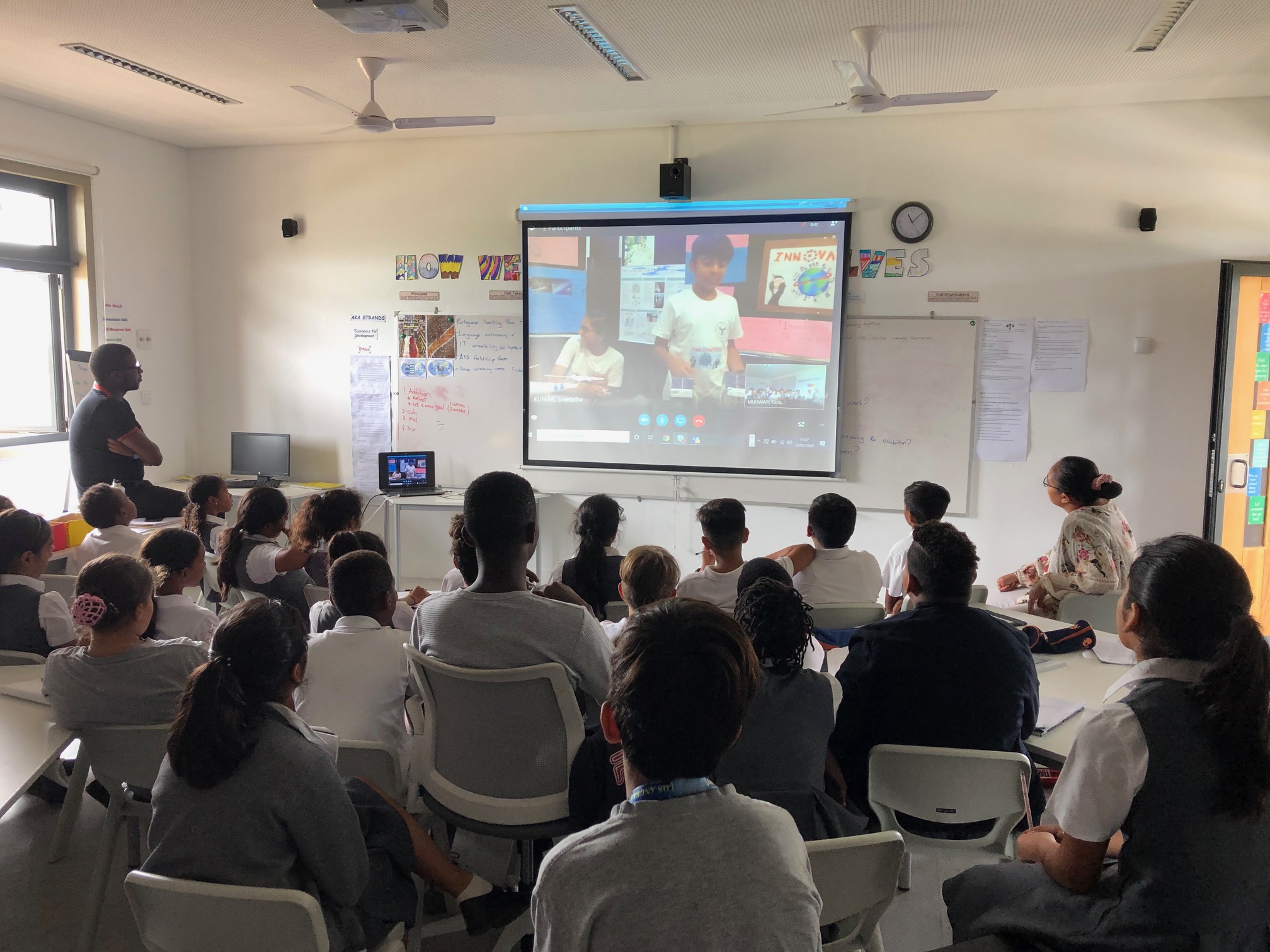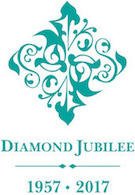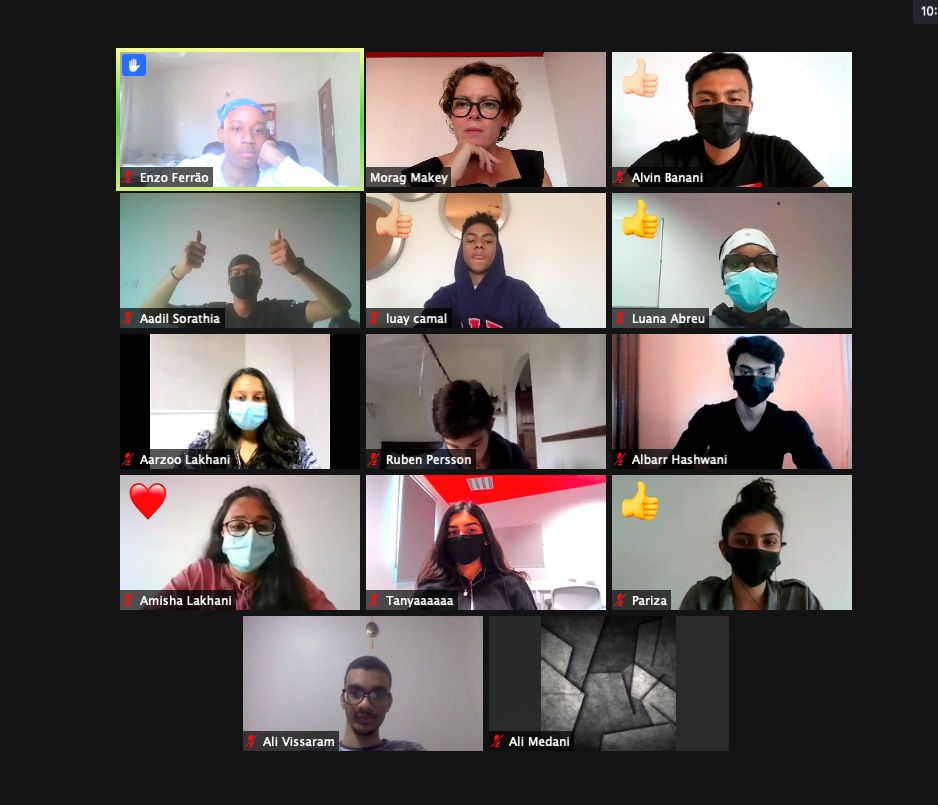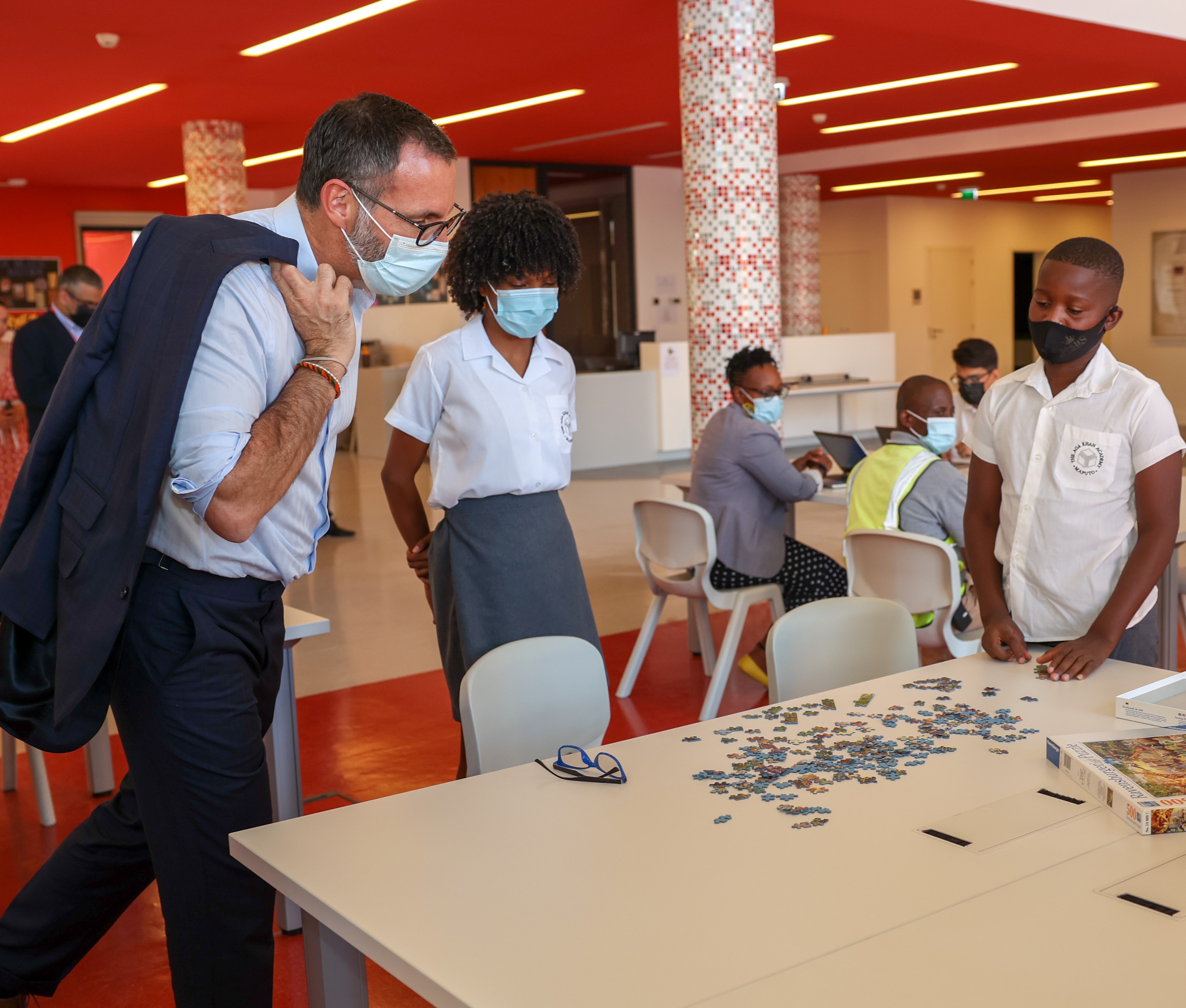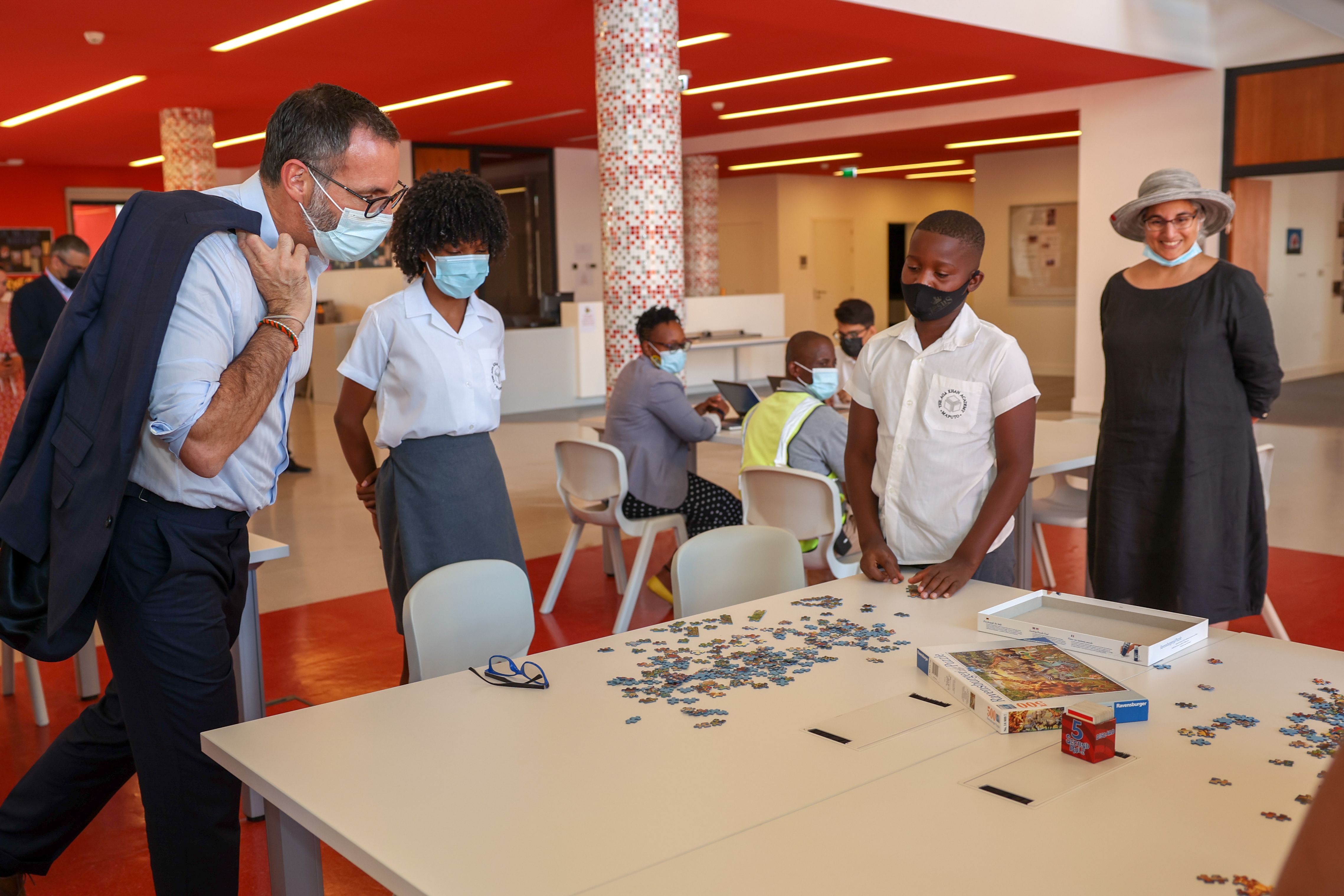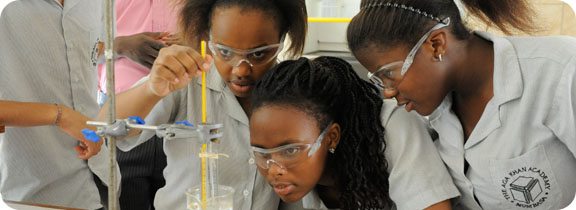
International Baccalaureate
The Aga Khan Academy Mombasa follows the principles of the International Baccalaureate (IB) and is an authorised IB World School.
The International Baccalaureate is a non-profit educational foundation, motivated by its mission to create a better world through education.
The three IB programmes offered at the Academy help develop the intellectual, personal, emotional and social skills to live, learn and work in a rapidly globalising world.
The three programmes are:
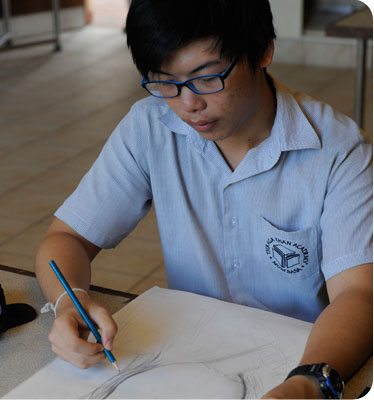
Primary Years Programme
The Primary Years Programme (PYP) at the Academy, for students aged 6–10, focuses on the development of the whole child, addressing social, physical, emotional, and cultural needs, while giving students a strong foundation in all of the major areas of knowledge. Through the PYP, children become aware of and sensitive to the points of view of people in other parts of the world.
Middle Years Programme
The Middle Years Programme (MYP), for students aged 11–16, integrates the study of all the major disciplines, including languages, sciences, literature and the social sciences, mathematics, arts, technology and physical education. The MYP normally includes a service component designed to encourage students to become involved with their communities.
Diploma Programme
The Diploma Programme (DP), for students aged 16–19, is a two-year course of study that prepares students for university. All DP students study languages, a social science, an experimental science, mathematics and, usually, an arts subject.
At the same time as it provides a form of academic passport, the DP generally fulfils the requirements of a student's national education system. Each student's performance is evaluated by independent examiners and measured by his or her levels of knowledge and skills relative to set standards applied to all schools.
Aims of the IB programme
Founded in 1968, the International Baccalureate currently works with 3,423 schools in 141 countries to develop and offer their programmes to over one million students.
Their mission statement declares: "The International Baccalaureate aims to develop inquiring, knowledgeable and caring young people who help to create a better and more peaceful world through intercultural understanding and respect."
"To this end the organisation works with schools, governments and international organisations to develop challenging programmes of international education and rigorous assessment. These programmes encourage students across the world to become active, compassionate and lifelong learners who understand that other people, with their differences, can also be right."
The IB is more than its educational programmes and certificates. At heart they are motivated by a mission to create a better world through education.
They value their hard-earned reputation for quality, for high standards and for pedagogical leadership.
They achieve their goals by working with partners and by actively involving stakeholders, particularly teachers.
For further information please visit the IB website.
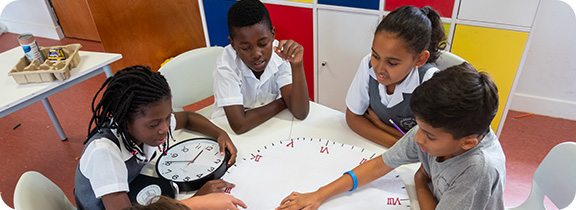
Academic Programme
The Aga Khan Academy Maputo is currently open for Nursery, Junior and Senior School students. We offer an education of an internationally recognised standard of excellence to prepare students to become intellectually curious, global-minded citizens of the world.The Academy programme develops students who are committed to positive change and are able to understand and analyse complex issues of local, national and global significance.
Our curriculum is built on the framework of the International Baccalaureate (IB). The IB is a thorough, multidisciplinary curriculum that fosters:
- intellectual curiosity
- creativity
- leadership development
- social consciousness
- a pluralistic sensibility.
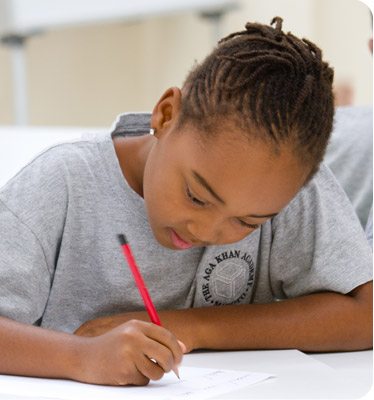
The IB is also known for preparing students for admission to the best universities in their own countries and abroad.
Our focus is on developing students' critical thinking skills and the ability to analyse issues. We also emphasise multicultural understanding and awareness. One of the ways in which we help our students develop skills for ethical leadership is through the Aga Khan Curricular Strands. These are cross-disciplinary areas of study that have been developed for the network of Aga Khan Academies.
Overall educational programme
Our curriculum is complemented by co-curricular, athletic and community service initiatives. The overall educational programme is designed to educate well-rounded, civic-minded individuals. It enhances students’ academic excellence, leadership skills, sense of civic responsibility, understanding of global issues, and analytical and study skills. The programme also reinforces an understanding of local languages, history, cultures and environment.
After completing the full Academy programme, students will be expected to be computer literate and have a thorough understanding of the diverse academic disciplines covered in the IB curriculum. They should have mastered at least two languages, including English. Through the planned international exchange programme, our students will be able to enhance their foreign language learning and appreciation of other cultures.
Our graduates thus will be well prepared for the rigours of higher education and to pursue opportunities in an increasingly interdependent world.
For further information on the programme currently being offered at the Aga Khan Academy Maputo, please visit the Primary Years Programme and Middle Years Programme pages.
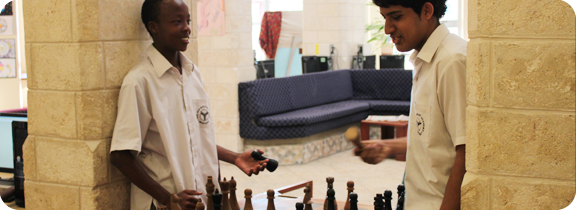
International Baccalaureate
The Aga Khan Academy, Dar-es-Salaam follows the principles of the International Baccalaureate (IB) and is preparing to become an authorised IB World School.
The International Baccalaureate (IB) is a non-profit educational foundation, motivated by its mission to create a better world through education.
The three IB programmes for students aged 3 to 19 help develop the intellectual, personal, emotional and social skills to live, learn and work in a rapidly globalising world.
Aims of the IB Programme
Founded in 1968, the International Baccalureate currently works with 3,423 schools in 141 countries to develop and offer their programmes to over one million students.
Their mission statement declares: "The International Baccalaureate aims to develop inquiring, knowledgeable and caring young people who help to create a better and more peaceful world through intercultural understanding and respect.
"To this end the organisation works with schools, governments and international organizations to develop challenging programmes of international education and rigorous assessment. These programmes encourage students across the world to become active, compassionate and lifelong learners who understand that other people, with their differences, can also be right."
The IB is more than its educational programmes and certificates. At heart they are motivated by a mission to create a better world through education.
They value their hard-earned reputation for quality, for high standards and for pedagogical leadership. They achieve their goals by working with partners and by actively involving stakeholders, particularly teachers.
The three programmes are:
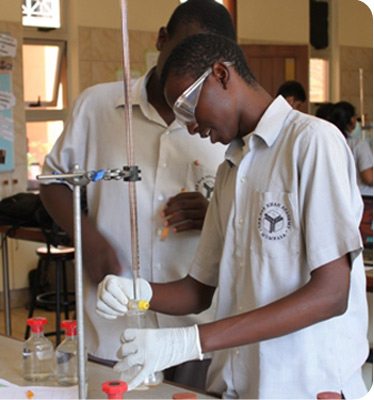 Primary Years Programme
Primary Years Programme
The Primary Years Programme (PYP) focuses on the development of the whole child, addressing social, physical, emotional and cultural needs, while giving students a strong foundation in all of the major areas of knowledge.
Through the PYP, children become aware of and sensitive to the points of view of people in other parts of the world.
Middle Years Programme
The Middle Years Programme (MYP) integrates the study of all the major disciplines, including languages, sciences, literature and the social sciences, mathematics, arts, technology and physical education.
The MYP normally includes a service component designed to encourage students to become involved with their communities.
Diploma Programme
The Diploma Programme (DP) is a two-year course of study that prepares students for university. All DP students study languages, a social science, an experimental science, mathematics and, usually, an arts subject.
At the same time as it provides a form of academic passport, the DP generally fulfils the requirements of a student's national education system. Each student's performance is evaluated by independent examiners and measured by his or her levels of knowledge and skills relative to set standards applied to all schools.
For further information please visit the website of the International Baccalaureate at http://www.ibo.org.
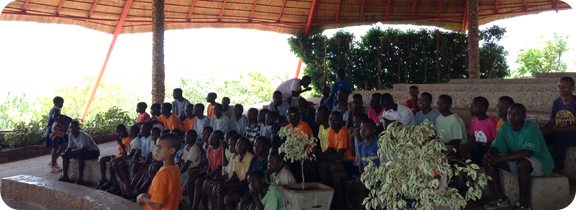
Community Service
Community service is an overarching and major facet of student education and experience at the Academies. Incorporated into student life and the curriculum, community service extends the educational experience beyond the classroom, informing students of the real-world implications of their studies. Through community projects with local organisations and groups, students gain a sense of the interconnectedness of their education with the world around them.
Students can participate in a variety of structured community initiatives and internships to learn about their place in the world.
By partnering with local Aga Khan Development Network agencies, students learn first-hand about the operations of an organisation and work towards making tangible contributions to the agencies.
In addition, community engagement provides an understanding of broad concepts such as human rights, dignity and autonomy, while emphasising the ethos of leaving the world a better place.
Examples of service projects from the Aga Khan Academy Mombasa:
Coast Rural Support Programme: Tree planting at Mtaa community reservoir. The reservoir was created as a community project. The outreach project involved planting 700 indigenous seedlings around the reservoir.
East African Quality in Early Learning: Creation of the Fun Reading Day initiative to promote early grade reading. Inspired by the common 1:10 ratio of students to books in local public primary schools, the first project was to collect books to establish a library at Ng’ombeni Primary School. Through a book drive and other community projects, students collected books and catalogued and prepared them for library use.
Our Junior School and Diploma Programme (DP) students visited the Ng’ombeni Primary School for group reading sessions. This project was then handed over to upcoming DP students to continue.
Education for Marginalised Children in Kenya (EMACK): Student’s council training workshop at Longo Primary School. Sarrah Sheikh came to know the Longo Primary School through her summer placement service. She went on to assist EMACK in establishing student leadership bodies, beginning with Longo Primary School. Topics covered went from effective leadership to communication tools, and the difference between prefects and elected student leaders. Three weeks after this project, the Kenyan government announced the phasing out of the prefect system and the introduction of elected student councils.
Madrasa Resource Centre: School painting project at Mpirani Nursery School. After visiting a school in disrepair, the DP students decided that a bright place was needed for the students to learn. They mobilised their fellow students to create bright learning materials and to repaint the school.
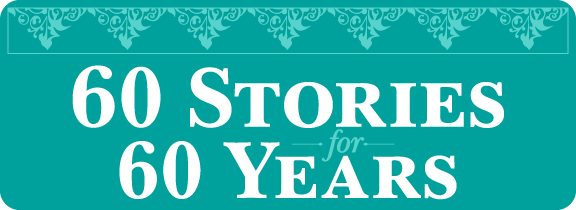
60 Stories for 60 Years
To meet these inspiring individuals, check here for a new story each week during the Jubilee year. On social media, you can like us on Facebook and follow us on Twitter @AKAcademies.
|
Alumna, Aga Khan Academy Mombasa |
Students, Aga Khan Academy Mombasa |
|
Alumna, Aga Khan Academy Hyderabad |
Teacher, Aga Khan Academy Hyderabad |
|
Student, Aga Khan Academy Maputo |
Staff, Aga Khan Academy Network |
|
Alumnus, Aga Khan Academy |
Student, Aga Khan Academy Hyderabad |
|
Teacher, Aga Khan Academy Hyderabad |
Student, Aga Khan Academy Mombasa |
|
Student, Aga Khan Academy Mombasa |
Alumna, Aga Khan Academy Mombasa |
|
Alumna, Aga Khan Academy Mombasa |
Alumnus, Aga Khan Academy Hyderabad |
|
Alumna, Aga Khan Academy Hyderabad |
Alumna, Aga Khan Academy Mombasa |
|
Student, Aga Khan Academy Hyderabad |
Alumnus, Aga Khan Academy Mombasa |
|
Student, Aga Khan Academy Hyderabad |
Teacher, Aga Khan Academy Maputo |
|
Alumna, Aga Khan Academy Hyderabad |
Student, Aga Khan Academy Mombasa |
|
Student, Aga Khan Academy Mombasa |
Staff, Aga Khan Academy Hyderabad |
|
Student, Aga Khan Academy Mombasa |
Teacher, Aga Khan Academy Maputo |
|
Student, Aga Khan Academy Mombasa |
Teacher, Aga Khan Academy Maputo |
|
Teacher, Aga Khan Academy Mombasa |
Alumnus, Aga Khan Academy Hyderabad |
|
Teacher, Aga Khan Academy Maputo |
Student, Aga Khan Academy Hyderabad |
|
Student, Aga Khan Academy Mombasa |
Staff, Aga Khan Academy Hyderabad
|
|
Alumnus, Aga Khan Academy Mombasa
|
Staff, Aga Khan Academy Mombasa |
|
Student, Aga Khan Academy Mombasa |
Parents, Aga Khan Academy Mombasa
|
|
Alumna, Aga Khan Academy Mombasa |
Alumna, Aga Khan Academy Mombasa |
|
Teacher, Aga Khan Academy Maputo |
Alumni, Aga Khan Academy Mombasa
|
|
Alumna, Aga Khan Academy Hyderabad |
Student, Aga Khan Academy Mombasa |
|
Alumna, Aga Khan Academy Hyderabad |
Alumna, Aga Khan Academy Mombasa
|
|
Alumnus, Aga Khan Academy Mombasa |
Student, Aga Khan Academy Mombasa |
|
Alumna, Aga Khan Academy Mombasa |
Student, Aga Khan Academy Hyderabad |
|
Teacher, Aga Khan Academy Maputo |
Student, Aga Khan Academy Mombasa |
|
Teacher, Aga Khan Academy Hyderabad |
Alumnus, Aga Khan Academy Mombasa |
|
Felix Ngumo |
Samson Suhas |
|
Sazil Ramani |
Karishma Bhagani |
|
Alumnus, Aga Khan Academy Mombasa |
Khushboo Khoja |
Residential programme reopening
The Aga Khan Academy Maputo's residential programme will reopen for all residential students on 8 August 2021. For more information, please contact the Head of Residences Ruth Kingston at (+258) 21720963.
